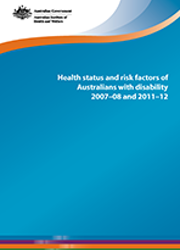Summary
This report examines how health-related factors affect the health status of Australians with disability at the national population level. Its focus is on the prevalence of-and age at onset of some major long-term health conditions and related health risk factors and behaviours.
Disability and self-assessment of health
Due to a range of factors-some of which may be directly related to a person's disability- people with disability, as a group, experience significantly poorer health than those without disability. In 2011-12, half (51%) of Australians aged 15-64 with severe or profound core activity limitation (that is, sometimes or always needing help with activities of self-care, mobility or communication) rated their health as poor or fair, compared with 6% for those without disability. The gap in self-assessed health between the two population groups remained large between 2007-08 and 2011-12. The respective proportions who reported poor or fair health were 45% versus 5% in 2007-08.
Long-term health conditions
In 2011-12, people aged under 65 with severe or profound core activity limitation had a higher prevalence of various types of long-term health conditions and were 3.3 times as likely as those without disability to have 3 or more long-term health conditions (74% versus 23%).
Half (50%) of people aged under 65 with severe or profound core activity limitation had mental health conditions, compared with 8% for those without disability. For people aged under 65 with mental health conditions, those with severe or profound core activity limitation were more likely than those without disability to acquire a mental health condition before the age of 25 (39% versus 28%).
People aged under 65 with severe or profound core activity limitation were 4 times as likely as those without disability to have arthritis (21% versus 5%). For people aged under 65 with arthritis, half (49%) of those with severe or profound core activity limitation acquired the condition before the age of 45, compared with 37% for those without disability.
Health risk factors and behaviours
In 2011-12, adults aged 18-64 with severe or profound activity limitation had a higher prevalence of overweight or obesity compared with people without disability (70% versus 60%). They were 1.7 times as likely as those without disability to be obese (43% versus 25%).
Almost half (46%) of people aged 15-64 with severe or profound disability reported doing no physical exercise compared with 31% of people without disability. Between 2007-08 and 2011-12, the difference in the respective proportions doing no exercise increased by 6 percentage points (40% versus 31% in 2007-08, compared with 46% versus 31% in 2011-12).
People aged 15-64 with severe or profound disability were twice as likely as those without disability to smoke daily (31% versus 15%) and 1.8 times as likely as those without disability to start daily smoking before the age of 18 (41% versus 23%).
Adults aged 18-64 with severe or profound core activity limitation were 20 times as likely as those without disability to have a very high level of psychological distress (22% versus 1%).
Preliminary material: Acknowledgments; Abbreviations; Symbols
1 Introduction
- Data source, scope and statistical methods
2 Disability and self-assessment of health
3 Prevalence of long-term health conditions
- Comorbidity of mental and physical long-term health conditions
- Age at onset of long-term health conditions
4 Health risk factors and behaviours
- Overweight and obesity based on measured data
- Physical inactivity
- Current daily smoker
- Risky alcohol consumption
- Psychological distress
End matter: Appendix tables; References; List of tables; List of figures; Related publications



